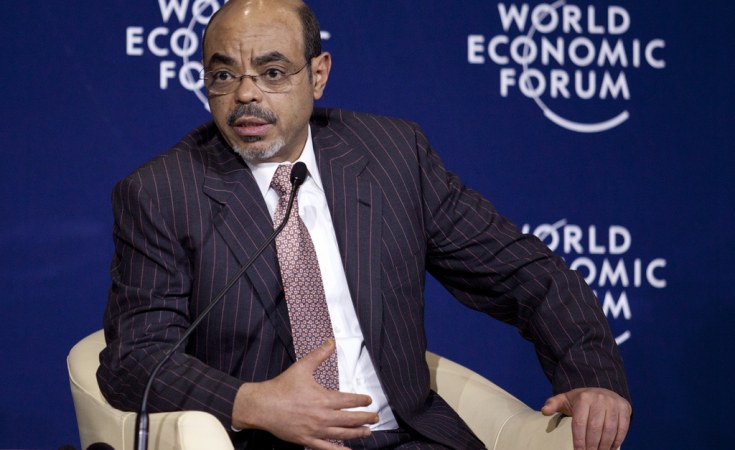Repressive and undemocratic, brilliant and determined, Ethiopia and the Horn of Africa will not see another Meles anytime soon.
Meles Zenawi, the late prime minister of Ethiopia, will be much missed as his ever expanding nation (now 85 million and heading to 120 million in 2025) faces a future laced with equal measures of promise and unnerving uncertainty.
Meles was among the smartest of sub-Saharan Africa's leaders. Unlike so many of his confreres, he had a strong and broad vision of how Ethiopia, once among the poorest and least educated of Africa's states, could prosper and provide better outcomes for its peoples.
Meles also knew that Ethiopia was not yet a nation, only a congeries of people united for a long time under the Amharic monarchy and Amharic Communist despotism and now forcibly glued together and conquered by Meles and his Tigrayan minority. Because Ethiopia is not yet a knitted together nation, with its disparate peoples and their disparate faiths capable of pursuing separatist agendas, Meles believed strongly that he had to be relentlessly centralising in his authoritarianism and forceful in his repression of dissidents while boosting educational opportunity and seeking the kinds of economic growth that would uplift the entire enterprise.
For strategic reasons he therefore welcomed Chinese overtures and praised Chinese enterprise and initiative at every turn. He turned to the Chinese to build big dams on the Omo River despite massive local and global environmental protests. Ethiopia desperately needs the energy. He was also determined the interrupt the flow of the Blue Nile River with a giant Grand Renaissance Dam despite deep concerns in Egypt and the Sudan. Whether that project will proceed under his successors is not yet known.
After Meles
Without Meles and his drive, the Grand Renaissance Dam and dozens of other projects may falter for lack of funding or lack of initiative. Likewise, no-one but Meles could have responded with alacrity when the US and the UN requested troops to keep the warring southern and northern Sudanese apart. His troops are also critically active in pushing back Islamists in Somalia, as they were in 2006 and 2007 at the request of the US.
The Horn of Africa will be more fragile and more subject to volatile adventurism without Meles' willingness to try to keep the peace. Militant Islamists in Somalia and perhaps his antagonists in Eritrea might also be emboldened.
At home, too, where he rigged two elections and was repressive against his opponents and all non-Tigrayans who refused to toe the official political line, a democratic space may develop. But the Tigrayan generals who fought with him against the Marxist Amhara before 1991 may refuse to tolerate any dissipation of their control. Nor might they and Meles' successors give more room to maneuver to the Oromo, the Galla, Somali, or Muslims who may wish to gain a stronger 'voice' within post-Meles Ethiopia.
An intelligent autocrat
When I spoke with Meles a few years ago for several hours in his hideaway office in State House, he was much more forthcoming than the other autocrats in Africa whom I have interviewed over the years. He was prepared to entertain hostile questions and to answer them. For example, he attempted persuasively to rationalise the falsification of the 2005 general election in Ethiopia and the subsequent jailing of nearly all of his opponents. He spun (as in "spin doctor") much more effectively than any of his all-powerful peers.
Meles also understood that someone like me had a legitimate interest in some of the terrible things that he was doing to his people and to those who believed in the democratic process. Yet he never bristled, never cut the interview short. Nor did he, as others might have done, attempt to deflect me onto his undoubted successes - such as the economic development of rapidly growing Ethiopia. Instead, he successfully tried to impress me with his general intelligence, his leadership skills, his ability to see around corners and protect the Horn of Africa against malevolence, and his careful balancing of the US and China in ways to benefit his regime and his country.
Ethiopia will not readily see his like anytime soon.
Robert I. Rotberg is President emeritus of the World Peace Foundation. An American professor in governance and foreign affairs, he was director of the Program on Intrastate Conflict, Conflict Prevention, and Conflict Resolution at Harvard University's John F. Kennedy School of Government (1999-2010), and has served in administrative positions at Tufts University and Lafayette College.In 2003-2004, he served as a member of the Secretary of State's Advisory Panel on Africa, and was a Presidential appointee to the Council of the National Endowment for the Humanities.


